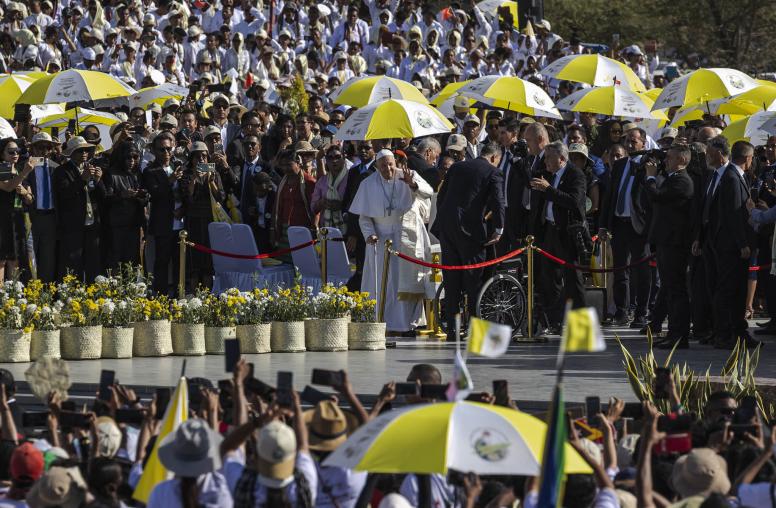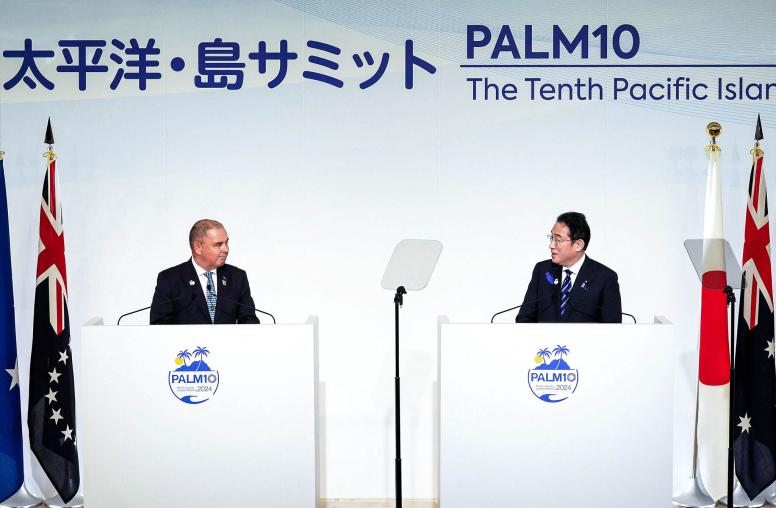New U.S. Plan is an Opportunity to Deepen Engagement with Papua New Guinea
The Global Fragility Act designation demonstrates the country’s importance in a vital geostrategic region.
In terms of geographical size and population, Papua New Guinea (PNG) is by far the biggest country among the Pacific Islands, a region increasingly central to U.S. strategic interests. Along with neighboring Solomon Islands, PNG is at the center of a growing geopolitical contest involving the United States and its allies and China. PNG has also long been wracked by domestic instability, which has depressed equitable economic growth and limited the country’s ability to play its natural role as regional leader and a bridge between the Pacific Islands region and East Asia. Despite PNG’s potential importance, the United States has a light political footprint in the country, particularly when compared to Australia, making PNG’s designation as a focus country under the Global Fragility Act (GFA) an opportunity to dramatically scale up engagement.

The GFA calls for a long-term, whole-of-government approach to preventing conflict and mitigating violence. It draws heavily on recommendations developed by the USIP-convened Task Force on Extremism in Fragile States. GFA priority countries are based on three criteria: 1) U.S. national security interests; 2) the level of violence or fragility in the country; and 3) the commitment and capacity of the country and the likelihood that U.S. assistance will be impactful. Besides PNG, the State Department has named Haiti, Libya, Mozambique, and West African coastal states (Benin, Côte d’Ivoire, Ghana, Guinea and Togo) as priority countries and regions under the GFA with which to implement the 10-year “U.S. Strategy to Prevent Conflict and Promote Stability.”
Why Papua New Guinea?
PNG — a resource-rich, democratic archipelago nation of mountainous highlands and coastal lowlands in the southwest Pacific — is no stranger to conflict. Intercommunal violence has occurred for centuries in the formerly colonized eastern half of New Guinea — divided in two by Germany and the United Kingdom, with the latter half administered by Australia — and it was the site of a civil war in the late 20th century. On the surface, state institutions reflect those of their former colonial administrator, but the depth and reach of these institutions are limited; indigenous understandings and practices of governance remain highly prevalent throughout the country. Today, this highly diverse population of approximately 9 million people faces several vectors of fragility, ranging from community-based violence centered on sorcery accusations to the potential secession of Bougainville, an autonomous region that voted in overwhelming numbers (97.7 percent of votes cast) in a nonbinding referendum to secede from PNG in 2019.
As a country that was already at a high degree of risk for major infectious diseases, the COVID-19 pandemic pushed PNG’s already fragile health care system to its breaking point. Challenges resulting from insufficient resources have been exacerbated by extremely low vaccination rates due to rampant misinformation about the virus and vaccines. PNG is also at high risk of natural disasters, with frequent and often severe earthquakes, volcanic activity, mudslides and tsunamis.
Formal economic opportunities are limited. The vast majority of the population lives in rural areas, with agriculture providing subsistence living for 85 percent of people. The export of natural resources — namely minerals such as gold, copper and silver; natural gas; oil; and timber — makes up the lion’s share of PNG’s small formal economy. In addition to fueling environmental degradation, natural resource extraction — and the distribution of its benefits — has long been a point of tension and violent conflict. In 1989, indigenous outrage over the Panguna copper mine sparked a civil war for Bougainville’s independence that ended with a peace agreement in 2001. More recently, elite squabbles over a multibillion-dollar deal with Total and ExxonMobil for liquified natural gas prompted PNG’s former prime minister, Peter O’Neill, to step down in 2019.
Though an electoral democracy with regular general elections, the robustness and effectiveness of PNG’s state governance institutions are extremely thin. O’Neill assumed the office of prime minister in 2011 with a political maneuver that the Supreme Court deemed unconstitutional. He maintained the premiership for eight years. The 2017 general elections were plagued by mismanagement, leading to outbreaks of violence, with the next set of general elections to take place in 2022.
Additionally, the future of Bougainville has contributed to anxieties about PNG’s stability. In 2019, 97 percent of Bougainville’s population voted in favor of independence in a referendum mandated by the 2001 peace agreement. Because the referendum was nonbinding and subject to ratification by the PNG Parliament, there was initial uncertainty as to whether Bougainville’s clear choice would be honored. The governments of PNG and the Autonomous Region of Bougainville have since agreed to a timeline for full independence by 2027; negotiations are proceeding fitfully. However, Bougainville’s future independence has raised the specter of more secessionist movements and further breakup of the country, although this is unlikely.
Additionally, the prevalence of crime and everyday violence has hindered economic growth. Greater access to modern weapons and increased urban migration have escalated and intensified low-scale intercommunal violence that has occurred for centuries. Rates of violence against women are among the highest in the world. Meanwhile, sorcery-accusation related violence represents the greatest threat to stability at the community level.
Strategies for Success
Each of the tools envisioned in the “U.S. Strategy to Prevent Conflict and Promote Stability” could be deployed to address individual indicators of fragility in PNG. For example, development assistance and trade and investment opportunities could help to build a more robust, diversified and equitable formal economy, reducing dependence on natural resource extraction and thereby the social tensions associated with it. Humanitarian assistance would help enhance the PNG government’s capacity to respond to global shocks like the COVID-19 pandemic and major disasters. Preventive diplomacy could be deployed to support a peaceful transition to independence in Bougainville and at a grassroots level to prevent village-based violence. Various types of foreign assistance could be used to bolster PNG’s democratic institutions and strengthen traditional structures that support community resilience.
Three principles will be essential for GFA implementation success in PNG:
- Emphasize grassroots engagement: Context- and conflict-sensitive grassroots engagement at the community level offers the greatest opportunity for creating change in PNG. U.S. funding will go further and will be more effective the closer it is to the community level, where the state effectively does not exist. However, implementers should proactively seek to work with church networks, which are key pillars of communities in PNG.
- Be realistic about institutions: The U.S. government should acknowledge that institutions are extremely weak in PNG and that politics centers on rent-seeking. It should be cautious about forging systemic change, even over a 10-year planning horizon, keeping in mind that Australia has undertaken efforts to build institutions over decades. Implementers should recognize that, given the entrenched institutional dynamics, the incentives of political leaders in Port Moresby may not align with leverage points for change, creating the risk that funds may not reach the right opportunities.
- Coordinate with partners: The United States is fortunate to have its close ally Australia as the most important international actor in PNG, but this will also make early coordination with Australia essential to success. The United States should avoid areas of support where Australia is heavily engaged, such as in police and defense training and basic health and education, and instead find areas of comparative advantage. Issues related to natural resource extraction, particularly mining, could be one such area.
Expanded U.S. engagement in PNG will be welcomed by the government and its people and has the potential to be an important pillar of U.S. engagement in the Pacific Islands region more generally. The United States retains enormous residual affection from World War II and has a great partner in Australia, while benefitting from not having the burden of being the major outside donor in PNG. A potential force multiplier for U.S. government engagement could be coordination with ExxonMobil, PNG’s largest international investor, on community engagement and policy issues with Port Moresby. For a 10-year strategy to meaningfully contribute to stability in PNG it will also require investment in education and dialogue in the United States where, while increasingly focused on the Pacific Islands region for strategic reasons vis-à-vis China, Pacific literacy remains anemic. Deep understanding of PNG’s unique context will be critical to success.
Nicole Cochran is senior program specialist for USIP’s Asia Center



